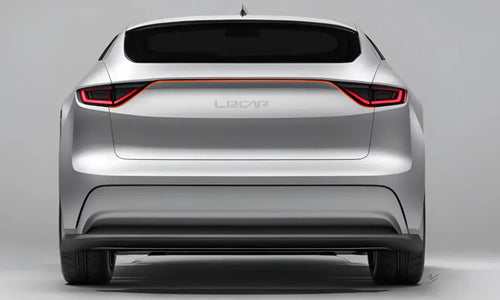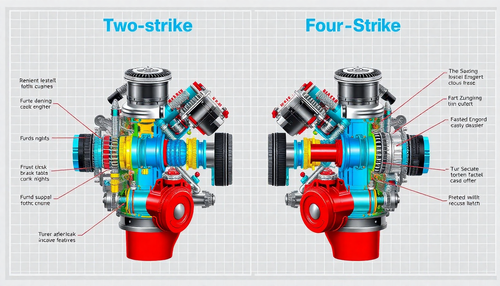-

Incentivos Fiscais de R$ 3,8 bilhões em 2025: Programa Mover na Indústria Automotiva
Em um cenário de constante evolução e desafios, a indústria automotiva brasileira recebe um impulso significativo com a implementação do programa Mover. Esse decreto regulamentador prevê a concessã...
-

Futuro da Indústria Automotiva: Tendências Tecnológicas Transformando o Setor
O setor industrial está passando por uma transformação acelerada, impulsionada por avanços tecnológicos que estão remodelando a maneira como as empresas operam, produzem e interagem com seus client...
-

Futuro da Mobilidade Automotiva no Brasil: Veículos Elétricos e Autônomos em 2025
Em 2025, a indústria automotiva brasileira está vivenciando uma transformação significativa, com o crescimento acelerado dos veículos elétricos, híbridos e autônomos. Essa revolução na mobilidade e...
-

A Revolução Tecnológica na Fábrica da Nissan em Resende
A Nissan, uma das principais montadoras do mercado automotivo brasileiro, acaba de concluir uma impressionante modernização de sua fábrica localizada em Resende, no estado do Rio de Janeiro. Esse i...
-

Setor Automotivo Brasileiro registra crescimento de 8% nas vendas no primeiro trimestre
O setor automotivo brasileiro tem vivido um momento de recuperação e crescimento nos últimos meses. De acordo com os dados mais recentes, as vendas de veículos no país registraram um aumento de 8% ...
-

Rodovias de Aço: A Revolução da Recarga Elétrica em Movimento
A revolução dos veículos elétricos está em pleno andamento, e com ela surge uma nova demanda: a necessidade de uma infraestrutura de recarga eficiente e acessível. É neste cenário que as rodovias d...
-

Chassis de Aço Inteligente: A Revolução da Segurança Autônoma
Em um mundo em constante evolução, a indústria automotiva está à beira de uma transformação revolucionária. Com o avanço da tecnologia, os carros autônomos estão se tornando uma realidade cada vez ...
-

Aços Avançados de Alta Resistência (AHSS) Revolucionando a Indústria Automotiva
A indústria automotiva está constantemente em busca de soluções inovadoras que permitam a fabricação de veículos mais leves, seguros e eficientes. Nesse contexto, os Aços Avançados de Alta Resistên...
-

Aço Reciclado impulsiona a Revolução das Motocicletas Elétricas
A indústria de motocicletas está passando por uma transformação revolucionária, com a adoção cada vez maior de veículos elétricos. Essa mudança é impulsionada não apenas pela crescente conscientiza...
-

Aço na Mobilidade Sustentável: Veículos Leves e Eficientes
A indústria automotiva enfrenta um desafio crucial: reduzir as emissões de carbono e melhorar a eficiência energética dos veículos, sem comprometer a segurança e o desempenho. Neste contexto, o aço...
-

Lecar, a nova estrela da indústria automotiva brasileira
A Lecar, uma empresa brasileira que está conquistando seu espaço no setor automotivo, acaba de anunciar planos ambiciosos para se tornar uma das principais fabricantes de veículos no país. Recentem...
-

A FIAT consolida sua liderança global em 2024
A FIAT confirma sua posição como marca líder da Stellantis em volume de vendas, dominando mercados importantes, como Brasil, Itália, Turquia e Argélia, com o Fiat Strada e Panda se destacando entre...
-

Tendências do Mercado Automotivo em 2024: Rumo a uma Mobilidade Mais Sustentável e Conectada
Uma análise de tendências de consumo no mercado automotivo em 2024 destaca a busca por marcas confiáveis, menor depreciação e custos reduzidos de manutenção, enquanto híbridos e elétricos despontam...
-

Revolução da Mobilidade Urbana: Ônibus Autônomos sem Mapas
No campo sonoro da robótica, a inovação constante é essencial para atender às necessidades de um mundo em rápida evolução. Um dos avanços mais fascinantes é a criação de sistemas de transporte públ...
-

Maior fábrica de Nióbio do mundo impulsiona a inovação em Baterias de Carregamento Ultrarrápido
Araxá, em Minas Gerais, é agora o local da maior fábrica de nióbio do mundo especializada em baterias de carregamento ultrarrápido. A unidade tem capacidade para produzir 2.000 toneladas por ano do...
-

Soluções poliméricas inovadoras apoiam a mineração de Lítio Sustentável
À medida que a demanda global por lítio continua a aumentar, impulsionada pelo aumento de veículos elétricos e tecnologias de energia renovável, os desafios de manutenção enfrentados pelas operaçõe...
-

Bio-Híbrido: Solução eficiente para a indústria automotiva
A chegada do Bio-Híbrido
Batizado de Bio-Híbrido, trata-se de um recurso eficiente, ajuda a economizar combustível e aumenta os preços dos SUVs compactos Pulse e Fastback em apenas R$ 2.000, ou sej...
-

Nissan e Mitsubishi Formam Nova Joint Venture para Mobilidade Autônoma e Elétrica
As gigantes japonesas Nissan e Mitsubishi, que estão ligadas por meio de suas participações na aliança com a Renault, formarão uma nova joint venture para fornecer serviços relacionados à direção a...
-

BID e BID Invest ampliam financiamento verde e climático na América Latina e Caribe
O Banco Interamericano de Desenvolvimento (BID) e seu braço para o setor privado, BID Invest, anunciaram recentemente uma ampliação significativa do foco na sustentabilidade climática e ambiental e...
-

Crescimento impressionante da Indústria Automotiva brasileira em 2024
O ano de 2024 tem sido um período de grande crescimento e otimismo para a indústria automotiva brasileira. Segundo os dados divulgados pela Associação Nacional dos Fabricantes de Veículos Automotor...
-

Toyota e Suzuki unem forças para lançar novo SUV Elétrico em 2025
Em uma movimentação estratégica no mercado automotivo, as gigantes Toyota Motor Co. e Suzuki Motor Corp. anunciaram uma colaboração histórica no segmento de veículos elétricos (EVs). O resultado de...
-

Mercado Global de Veículos Elétricos rumo ao Trilhão de Dólares
O mercado global de veículos elétricos (VEs) está em forte ascensão e deve atingir US$ 1 trilhão em receita até 2028, com um crescimento projetado de 27% nas vendas. Mesmo com obstáculos como infra...
-

Futuro dos Veículos Elétricos e Mobilidade: Desafios e oportunidades no Brasil
No final de 2022, a União Europeia local o acordo "Fit For 55", com o objetivo de encerrar as vendas de carros novos emissores de CO₂ na Europa até 2035. O anúncio fez com que vários montadoras glo...
-

Detectando falhas de baterias de Veículos Elétricos antes que seja tarde demais
As baterias em veículos elétricos podem falhar rapidamente, às vezes pegando fogo sem muito aviso. O Sandia National Laboratories está trabalhando para detectar essas falhas cedo e fornecer tempo d...
-

Bentley atrasa meta de oferecer apenas Veículos Elétricos para 2035
A marca britânica de ultra-luxo, pertencente ao grupo Volkswagen AG, adiou novamente sua meta de oferecer apenas veículos elétricos a bateria (BEVs) em cinco anos, agora para 2035. No entanto, plan...
-

O Primeiro Caminhão Híbrido Conceito do Mercado Nacional
A Volkswagen Caminhões e Ônibus e a Suspensys, uma das empresas de autopeças do Grupo Randon, está desenvolvendo o primeiro caminhão conceito híbrido do mercado nacional. O protótipo foi apresentad...
-

FPT Industrial investe R$ 127 milhões em novas tecnologias de propulsão
A FPT Industrial, marca integrante do Grupo Iveco dedicada ao design, produção e venda de motores, informou que irá investir R$ 127 milhões em pesquisa e desenvolvimento de novas tecnologias de pro...
-

Reciclagem de Baterias de Veículos Elétricos: O Papel de liderança da China
A China talvez esteja em uma posição privilegiada quando se trata de adoção de veículos elétricos (VE), respondendo por mais de 60% das vendas mundiais em 2022. Essa posição dominante a torna um pa...
-

Solução Inovadora para preservar a privacidade na internet dos Veículos
Cientistas afirmam ter desenvolvido uma ferramenta de inteligência artificial para consolidar a privacidade dos veículos e de seus motoristas. Como preservar a privacidade da chamada Internet dos V...
-

Avanço significativo em Baterias de Íons de Lítio: Cátodos ricos em Lítio com Vanádio
À medida que a demanda por veículos elétricos e sistemas de armazenamento de energia aumenta, as baterias de íons de lítio precisam fornecer densidades de energia mais altas a custos mais baixos. E...
-

Vendas de veículos automotores no Brasil atingem novo recorde em 2024
As vendas de veículos automotores no Brasil continuam em alta, com um crescimento expressivo de 16,4% no acumulado de janeiro a outubro de 2024 em comparação ao mesmo período do ano anterior. Segun...
-

Vendas de veículos no Brasil crescem 21,6% em outubro de 2024
A indústria automotiva brasileira registrou um desempenho positivo em outubro de 2024, com um aumento de 21,6% nas vendas de veículos em comparação com o mesmo mês do ano anterior. De acordo com os...
-

Reduzindo os Custos de Teste de Chips Automotivos com Machine Learning
Os chips acabados que vêm da fundição são submetidos a uma bateria de testes. Para aqueles destinados a sistemas críticos em carros, esses testes são particularmente extensos e podem adicionar de 5...
-

A Integração de Veículos Automatizados: Promovendo a Confiança dos Passageiros com Explicações Oportunas
A integração de veículos automatizados promete vários benefícios para a mobilidade urbana, incluindo maior segurança, redução de congestionamento de tráfego e acessibilidade aprimorada. Veículos au...
-

Motor a água da Toyota: Revolução Silenciosa da Mobilidade
A Toyota, uma das líderes do setor automotivo, acaba de apresentar uma inovação que pode redefinir o futuro dos transportes. Um motor movido a água, altamente eficiente e ecológico, promete não só ...
-

Toyota do Brasil anuncia expansão de fábrica em Sorocaba
A Toyota do Brasil acaba de anunciar uma grande expansão de sua fábrica em Sorocaba, no interior de São Paulo. Este investimento de R$ 11 bilhões faz parte do plano de investimentos da empresa para...
-

Combustíveis: Entendendo as Características e Propriedades
Combustíveis são quaisquer materiais que armazenam energia potencial em formas que liberam energia térmica ao queimar em oxigênio. O poder calorífico do combustível é a quantidade total de calor li...
-

Ascensão da BYD: Como a marca Chinesa está desafiando a Tesla
A BYD, marca que começou com a produção de baterias e hoje desafia gigantes globais, está mudando o cenário da indústria automotiva com uma trajetória que exemplifica o poder da inovação e da expan...
-

Motores de 2 Tempos vs. 4 Tempos: Entendendo as diferenças
Ao comparar o motor de 2 tempos com o motor de 4 tempos, é essencial entender o que diferencia esses tipos de motor. Cada um tem benefícios, aplicações e características de desempenho exclusivos, t...
-

Ecossistema de Aplicativos: 5 coisas essenciais para se ter dominio
Os ecossistemas de aplicativos estão se expandindo e se tornando mais complexos com o surgimento de aplicativos baseados em IA, esforços de modernização e novas iniciativas. Embora eu não ache que ...
-

Um avanço na ciência dos materiais pode ajudar a entregar uma nova geração de baterias acessíveis
A busca por baterias mais eficientes e acessíveis é um desafio constante na indústria de energia. Recentemente, uma equipe internacional de pesquisadores liderada por químicos da Universidade de Gl...
-

Caracterização de Baterias de Íons de Lítio com Ânodos de Silício usando Espectroscopia de RMN
Pesquisadores do Laboratório Nacional Argonne do Departamento de Energia dos EUA (DOE) desenvolveram e demonstraram um conjunto inovador de métodos para avaliar o envelhecimento a longo prazo em cé...
-

Fiat solidifica liderança no mercado Automotivo brasileiro em 2024
O mês de outubro de 2024 foi marcado por uma expressiva liderança da Fiat no mercado automotivo brasileiro. Com 20,9% de participação e 51.867 unidades emplacadas, a marca consolidou sua posição ta...
-

Carros Elétricos vs. Combustíveis Renováveis: Dilema da Sustentabilidade
Com recorde de vendas em 2024, os carros elétricos são promovidos como solução verde, mas especialistas questionam o impacto ambiental das baterias e a complexidade da reciclagem, abrindo espaço pa...
-

Jeep no mercado brasileiro: Liderança nos principais segmentos de SUVs
A Jeep encerrou o mês de outubro com 12.014 emplacamentos, marcando seu melhor desempenho de vendas nos últimos três meses. Com este resultado, a montadora atinge um total de 99.930 unidades comerc...
-

Waymo e o uso do Gemini na Direção Autônoma
A decisão da Waymo de utilizar o Gemini em seu sistema de direção autônoma é significativa por várias razões. Primeiro, ela representa uma mudança no uso de IA generativa e modelos de linguagem de ...
-

Indústria de Autopeças Brasileira projeta crescimento de 8% em 2024
A indústria de autopeças brasileira está se preparando para um ano de 2024 promissor, com projeções de faturamento revisadas e altas significativas em diversos segmentos. De acordo com o Sindicato ...
-

Stellantis acelera transformação com foco em eletrificação e adaptação aos consumidores
Em 2024, a Stellantis vem solidificando sua posição no mercado automotivo global com uma série de lançamentos estratégicos e foco em tecnologias multienergia. As novas plataformas STLA, desenvolvid...
-

Importância da Estamparia na Indústria Automotiva
Os carros são chamados de "máquinas que mudam o mundo". Como a indústria automobilística tem uma forte correlação industrial, ela é considerada um símbolo importante do nível de desenvolvimento eco...
 Matching the growing demands of mobile, portable/wearable, automotive and industrial applications and meeting growing regulatory requirements, the two series are also available as Q portfolio devices.
Matching the growing demands of mobile, portable/wearable, automotive and industrial applications and meeting growing regulatory requirements, the two series are also available as Q portfolio devices.

















































